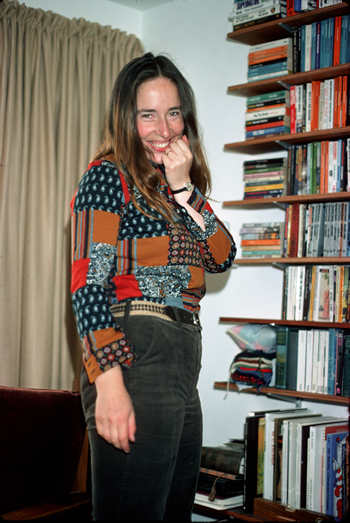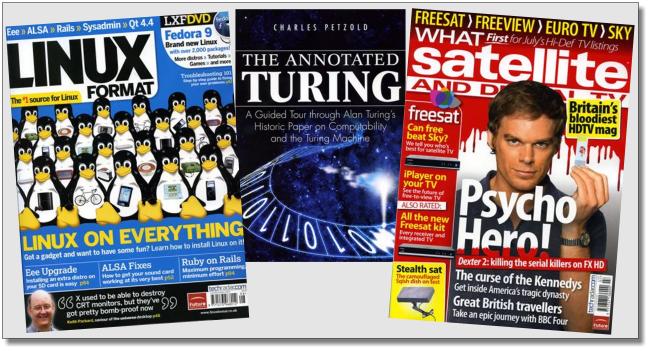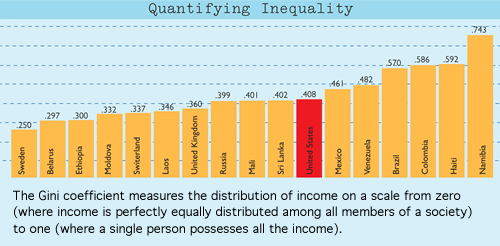2008 — 27 June: Friday
Past midsummer, past midnight, and Friday again already. Completely impossible on all three counts. Tonight's picture shows Christa in a corner of the Old Windsor living room. Gawd knows what she was giggling about...
 Christa in the Old Windsor living room, 1978ish
Christa in the Old Windsor living room, 1978ish
We (again, well, I) still have some of the books you can see here. The grey ones level with her left elbow, for example, are a series of hard-boiled thrillers featuring "Parker" and written by Donald E Westlake under one of his pen-names: Richard Stark. I remember my Dad enjoyed these, too. Oh well, g'night, at 00:44 as I'm too tired to stay up and watch Rocky Horror on ITV3.
Where's the sun (son) gone?
At 10:45, and after at least some rain overnight, it's a mite cooler and rather grey. Delicious! Almost no pollen detectable by my built-in advanced ocular system. Despite being a "stay-at-home" Dad, I still manage to miss some interesting radio programmes... The BBC home page is currently reminding me I missed a 30-minute examination of one of Junior's favourite childhood books — Where the Wild Things Are — interesting to see that the web site overlays the text material on a monochrome area of the image, too:
If Christa and I had been paid for each time we read this (and In the Night Kitchen1) to him, we'd be rich indeed! Mind you, in March 1981 I'd bought my large tome by Selma Lanes about Maurice Sendak's artwork (in Putney, while on a farewell visit to see my about-to-be ex-ICL manager and my last-ever trip to ICL's HQ as I was then on the point of changing employers to IBM) before Peter was one year old. Ho hum.
Now, had I been in Philadelphia, at the Rosenbach Museum & Library last month:
The Rosenbach will cap a forty-plus-year relationship with Maurice Sendak with "There's a Mystery There: Sendak on Sendak" this May, the largest ever exhibition of the artist's work. Three large rooms are dedicated to his work, going far past the well-worn Where the Wild Things Are into his sadly less well-known and far more adult work. Numerous related events, including the Sendak in Spring festival, should expose many newcomers to the great secret trove that is the Rosenbach.
Time for a spot of breakfast while contemplating the ineffable whichness of the why. And then, I rather think, a trip into Southampton ahead of the lunch-time hordes. Gotta do my bit for the UK economy. (People moan about the cost of petrol. Printer ink, I'm assured, is about £5,200 per gallon though it's fair to say a gallon of the stuff should last you through several economic downturns.)
Sweet Gini (coefficient)... dept.
The recent increase in inequality reflects a migration of money upward as salaries have ballooned at the top. In 1965, the average salary for a CEO of a major U.S. company was 25 times the salary of the average worker. Today, the average CEO's pay is more than 250 times the average worker's.
Perhaps, if Bill Gates were to emigrate?
Earth to aliens... dept.
I have to say this made me laugh.
A common science fiction trope involves aliens intercepting our television shows and being so impressed that they use it as a basis for their entire civilization. That's pretty egotistical. Even human beings don't base their entire lives on one long-defunct television show. Well, except for Firefly fans.
Well, I liked Firefly.
Oops!
I've just (15:04) finished listening to Petrushka but the BBC Radio 3 playlist insists I was hearing Smetana — my agile brain deduces they're running over 30 minutes late, which isn't too hot for a concert that started at 14:00. Now they're playing one of Christa's favourite orchestral pieces, and I'm going to have to change channels or stop typing for a while.
Back from a small outburst of retail therapy:

Linux Format is doing a little mini-series on2 my little Linux laptop at the moment. The What Satellite group test on Freesat kit is to prepare me for what Mr John Lewis assured me is a delivery of the Humax HD PVR "in August" though he admitted the dearth of information until one day before the launch had been a bit unhelpful. (The Freesat consortium had been afraid of what Sky might do, hence all the cloak-and-dagger, it seems.) As for the Turing,3 well, that's pure self-indulgence. I had always promised myself that — one day — I would read Alan Turing's original 1936 paper: "On Computable Numbers, with an Application to the Entscheidungsproblem". How better to do so than with a line-by-line accompaniment and explanation to help this greybeard through the 36 page original?
Christa would have loved this quote from Faster Than Thought: A Symposium on Digital Computing Machines (1953) which author Charles Petzold places on what is usually the "dedication" page:

In fact, I can hear her giggling right now. Just as I am, having just read "How do we tell truths that might hurt?" (Source: EWD498.) Time for another cuppa.
Measures of speediness
As I drive around, I admit my speedometer (a brightly-lit pair of digits) creeps a little over "30" in a 30 miles/hour limit (but, from observation, the dominatrix who lives in the Sat Nav system has me convinced that I don't actually exceed 30 miles/hour until the GPS says so — at a displayed speed of "33"). If I were to reset the display to read km/hour instead, I could amuse myself (I'm easily amused) with the thought that I could more easily consider my speed in terms of fractions of the speed of light because one nano-c is very close to 1 km/hour.
"Warp factor five, Mr Sulu!" It's time (18:03) to hit the kitchen galley.
Confessions of a BBC liberal?
I really should catch up on my reading more effectively. For example, there's a long piece here by Antony Jay (with 69 comments, too). It's from last August (I was more than a bit pre-occupied back then, with Christa's final illness) and shows he has not lost his engaging readability. (Random example: Say "Tesco" to a media liberal and the patellar reflex says, "Exploiting African farmers and driving out small shopkeepers.") A lesser writer would say "knee-jerk", of course. Anyway, it sent me back to the bookshelf to hunt down his views on corporate religion and heresy:
In corporation religions as in others, the heretic must be cast out not because of the probability that he is wrong but because of the possibility that he is right... Not all corporations, of course, have a leader to whom divinity could be attached with even a remote appearance of credibility... The industrial religion also has a hereafter, but it starts at sixty or sixty-five instead of death.
There's more, in similarly engaging vein, but I fear for the effects on my former co-workers' blood pressures!

